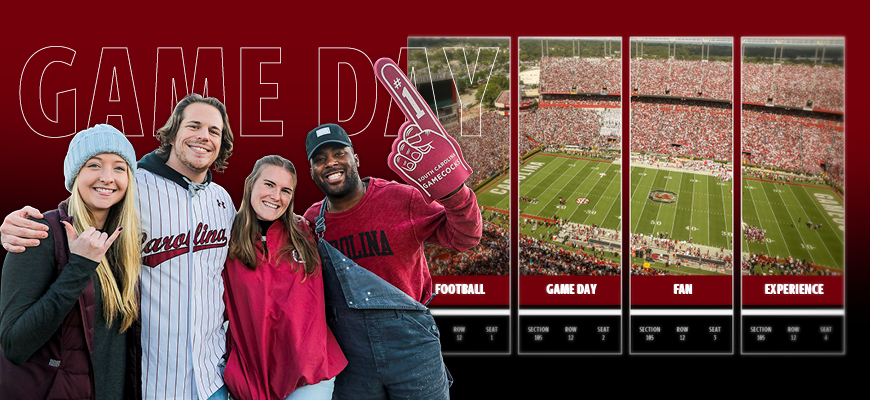
Students’ data analysis helps Gamecock Athletics cultivate stronger relationships with fans
Posted on: June 10, 2022; Updated on: June 10, 2022
By Savannah Bennett, mrassist@mailbox.sc.edu
Let’s set the scene. It is the first football game of the season, excitement fills the air, Sandstorm is blasting — it is Saturday in South Carolina. There is a rush of fans from all over pouring into the entrances of Williams-Brice Stadium ready for the season to start and hopeful for the games ahead. As home games come and go throughout the season, loyal fans may notice the functionality of the stadium and game-day atmosphere changes — that is intentional.
Using real-time analysis, Gamecock Athletics reviews survey data and makes adjustments to game-day logistics to improve the overall fan experience. This quantitative research is housed in the Athletics’ Business Intelligence Unit with the goal of using data analytics to answer crucial ticketing questions.
Athletics looked inward for talent to conduct these analyses, which led them to a group of eight students from the Darla Moore School of Business and the College of Hospitality, Retail and Sport Management.
Included in this team of students was Shreyas Saboo, ’21 sport and entertainment management, ’22 master's business analytics.
“This was one of the most fun learning experiences I have had because it combined two things I really love — analytics and sports,” Saboo says. “I got to use what I learned in undergrad and most of what I was learning during my master’s program.”
Data analytics is an area of strength across the university, especially so in the Moore School. Capitalizing on this strength, Gamecock Athletics created the project to better understand the changing appetite for season tickets in sports and, specifically, to analyze non-renewals of football season ticket holders.
“We chose to utilize students because we have a sandbox within which students interested in sports analytics can solve real-world problems while helping us gain strategic insights,” says Eric Nichols, senior associate athletics director for marketing and branding.
Drawn to South Carolina from Nagpur, India, for the sport and entertainment management program, Saboo developed a love for the business side of sports as well as analytics leading him to get a masters’s in business analytics one year after receiving his undergraduate degree.
When the opportunity presented itself to combine his two areas of study, Saboo couldn’t turn it down.
“Seeing this work turn into an actual product for a real client was extremely helpful and has given me a project to talk about in job interviews,” Saboo says.
With encouragement to have fun, students were able to pull data to creatively inform and develop new ideas.
For the team, the goal was to determine which factors make Gamecock football season ticket holders more likely to renew. The students focused on the difference between email open rates and renewal percentages. Analysis of these numbers resulted in new and different insights.
By looking at the accounts by age, the students were able to extract data about how email customization had an impact on ticket renewal — expanding on what the office expected to learn and offering insights to guide future analyses.
The analysis by the student teams led Gamecock Athletics to make the decision to customize emails — particularly to young alumni — to increase the likelihood recipients will open and engage with the message.
“We’ve seen that the more likely they do that, the more aware they are of the renewals and that’s led to higher renewal rates.” says Dan Stahl, associate athletics director for revenue generation and business intelligence.
“We also looked at the length of consecutive years and where there was some significant drop-offs. Did we need to get members over a certain number of years consecutively so that they’ll be a lifetime fan?” Stahl says.
The investment made in data has led to tangible efforts by the athletics department in ticketing and improving the fan experience. From customized emails to increased open rates to videos from coaches addressing individual fans, the insights developed from this project have opened doors to cultivating stronger relationships with fans.
“We expected to learn some actionable notes that we could build strategies around that might assist in retaining ticket buyers. We believe we got a good first-run at analyzing the data,” Nichols says. “We learned there might be additional categories of data to collect, (including) the lingering challenges of the COVID era.”